The AMD 3rd Gen Ryzen Deep Dive Review: 3700X and 3900X Raising The Bar
by Andrei Frumusanu & Gavin Bonshor on July 7, 2019 9:00 AM EST** = Old results marked were performed with the original BIOS & boost behaviour as published on 7/7.
Benchmarking Performance: Web Tests
While more the focus of low-end and small form factor systems, web-based benchmarks are notoriously difficult to standardize. Modern web browsers are frequently updated, with no recourse to disable those updates, and as such there is difficulty in keeping a common platform. The fast paced nature of browser development means that version numbers (and performance) can change from week to week. Despite this, web tests are often a good measure of user experience: a lot of what most office work is today revolves around web applications, particularly email and office apps, but also interfaces and development environments. Our web tests include some of the industry standard tests, as well as a few popular but older tests.
We have also included our legacy benchmarks in this section, representing a stack of older code for popular benchmarks.
All of our benchmark results can also be found in our benchmark engine, Bench.
WebXPRT 3: Modern Real-World Web Tasks, including AI
The company behind the XPRT test suites, Principled Technologies, has recently released the latest web-test, and rather than attach a year to the name have just called it ‘3’. This latest test (as we started the suite) has built upon and developed the ethos of previous tests: user interaction, office compute, graph generation, list sorting, HTML5, image manipulation, and even goes as far as some AI testing.
For our benchmark, we run the standard test which goes through the benchmark list seven times and provides a final result. We run this standard test four times, and take an average.
Users can access the WebXPRT test at http://principledtechnologies.com/benchmarkxprt/webxprt/
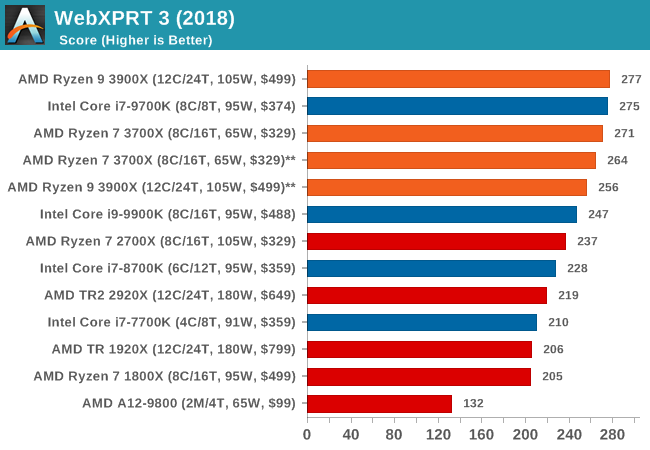
WebXPRT 2015: HTML5 and Javascript Web UX Testing
The older version of WebXPRT is the 2015 edition, which focuses on a slightly different set of web technologies and frameworks that are in use today. This is still a relevant test, especially for users interacting with not-the-latest web applications in the market, of which there are a lot. Web framework development is often very quick but with high turnover, meaning that frameworks are quickly developed, built-upon, used, and then developers move on to the next, and adjusting an application to a new framework is a difficult arduous task, especially with rapid development cycles. This leaves a lot of applications as ‘fixed-in-time’, and relevant to user experience for many years.
Similar to WebXPRT3, the main benchmark is a sectional run repeated seven times, with a final score. We repeat the whole thing four times, and average those final scores.
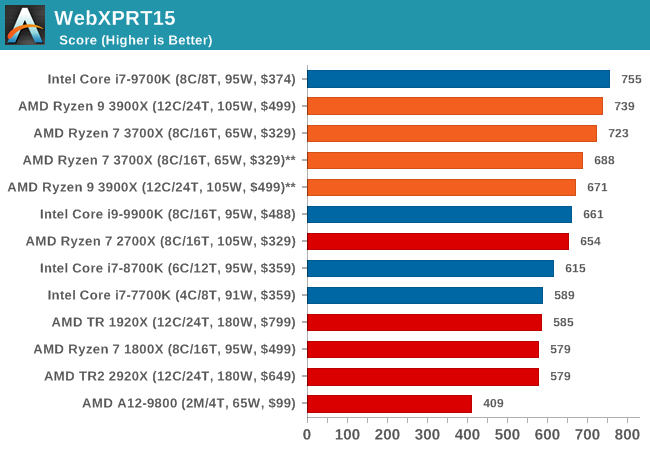
Speedometer 2: JavaScript Frameworks
Our newest web test is Speedometer 2, which is a accrued test over a series of javascript frameworks to do three simple things: built a list, enable each item in the list, and remove the list. All the frameworks implement the same visual cues, but obviously apply them from different coding angles.
Our test goes through the list of frameworks, and produces a final score indicative of ‘rpm’, one of the benchmarks internal metrics. We report this final score.
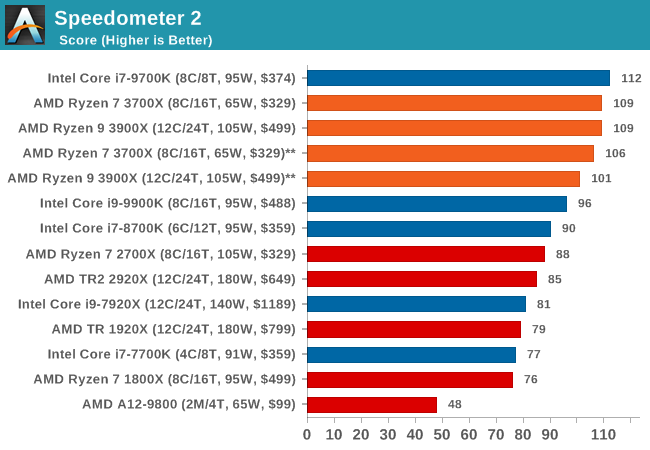
Google Octane 2.0: Core Web Compute
A popular web test for several years, but now no longer being updated, is Octane, developed by Google. Version 2.0 of the test performs the best part of two-dozen compute related tasks, such as regular expressions, cryptography, ray tracing, emulation, and Navier-Stokes physics calculations.
The test gives each sub-test a score and produces a geometric mean of the set as a final result. We run the full benchmark four times, and average the final results.
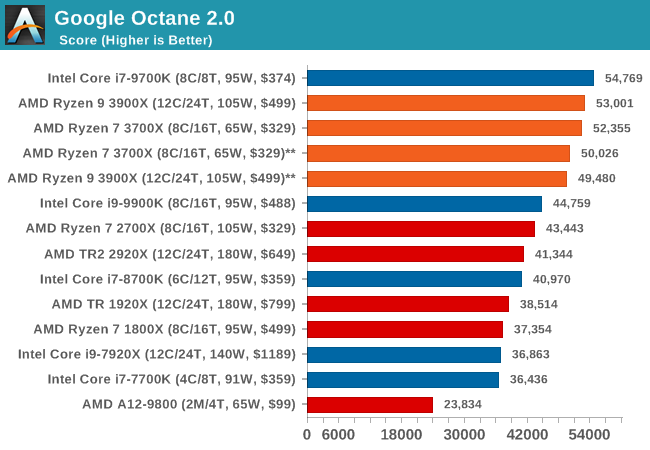
Mozilla Kraken 1.1: Core Web Compute
Even older than Octane is Kraken, this time developed by Mozilla. This is an older test that does similar computational mechanics, such as audio processing or image filtering. Kraken seems to produce a highly variable result depending on the browser version, as it is a test that is keenly optimized for.
The main benchmark runs through each of the sub-tests ten times and produces an average time to completion for each loop, given in milliseconds. We run the full benchmark four times and take an average of the time taken.
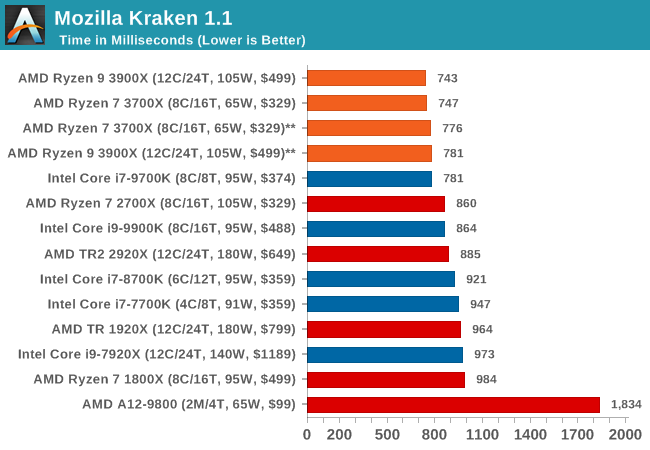
Web Tests Analysis
Overall, in the web tests, the new Ryzen 3900X and 3700X perform very well with both chips showcasing quite large improvements over the 2700X.
We’re seeing quite an interesting match-up against Intel’s 9700K here, which is leading all of the benchmarks. The reason for this is that SKU has SMT turned off. The singe-threaded performance advantage of this is that the CPU core no longer has to share the µOP cache structure between to different threads, and has the whole capacity dedicated to one thread. Web workloads in particular are amongst the most instruction pressure heavy workloads out there, and they benefit extremely from turning SMT off on modern cores.
Whilst we didn’t have the time yet to test the new 3900X and 3700X with SMT off, AMD’s core and op cache works the same in that it’s sharing the capacity amongst two threads, statically partitioning it. I’m pretty sure we’d see larger increases in the web benchmarks when turning off SMT as well, and we’ll be sure to revisit this particular point in the future.










447 Comments
View All Comments
beginning - Thursday, July 11, 2019 - link
I noticed that at the E3 2019 tech day, AMD recommended DDR4-3600 CL16 RAM. I see that 3200 MHz RAM has been used in the AMD testbench. I read the description about avoiding overclocking but 3600 MHz RAMs come with a factory clock of 3600 MHz, right? I know I am missing something. What am I missing?sknaumov - Thursday, July 11, 2019 - link
Do you plan to make some tests of these CPUs on older, cheaper and colder motherboards? It would be very interesting to see results of b450 chipset and whether it is possible to use DDR4-3600MHz with tight timings on these older boards. Or at least provide more info about what has more priority for memory speed and timings on AMD platform - CPU or chipset.viperswhip - Thursday, July 11, 2019 - link
I am going to wait to build a PC for a bit, however, I am super excited by this launch and disappointed by the video card launch. I expect to have an AMD chip since Intel has no answer for this, and we shall see on the video cards, but if I was building today I'd probably get a 2070 RTX super.PProchnow - Friday, July 12, 2019 - link
Here's is Jus' a good ol' boy trying out. No OC off stock Multi but 3333Mhz RAM#1
https://browser.geekbench.com/v4/cpu/13863634
Rather a new rig and it is X470 up to the A.A BIOS and it is MSI Gaming Plus.
OK link #2 is here and I stroked the DDR$ up top 3333Mhz. I also stroked the fan
to stay sub 70C. Wild OCs will take water at least "in The Home" versus LiqN2 Lab.
https://browser.geekbench.com/v4/cpu/13865361
BTW where is the Bragging Thread? My MOBO is the MSI X470 Gaming Plus BIOS A.A makes Ryzen 9 go BTW.
I have yet to up the MULTI in case you want to know. I wonder what good Ocers will get with the right stuff.
Single-Core Performance
Memory Score 6431
Floating Point Score 5409
Integer Score 5190
Crypto Score 6888
Single-Core Score 5589
You underst and that RAM set at 1672 is 1/2 the common referred to speed. 3344Mhz is the common nomenclature.
***Single-Core Score ***Multi-Core Score
5589 47755
Geekbench 4.3.4 Tryout for Windows x86 (64-bit)
Result Information
Upload Date July 12 2019 08:16 PM
Views 2
System Information
System Information
Operating System Microsoft Windows 10 Pro (64-bit)
Model Micro-Star International Co., Ltd. MS-7B79
Motherboard Micro-Star International Co., Ltd. X470 GAMING PLUS (MS-7B79)
Memory 32768 MB DDR4 SDRAM 1672MHz
Northbridge AMD Ryzen SOC 00
Southbridge AMD X470 51
BIOS American Megatrends Inc. A.A0
Processor Information
Name AMD Ryzen 9 3900X
Topology 1 Processor, 12 Cores, 24 Threads
Identifier AuthenticAMD Family 23 Model 113 Stepping 0
Base Frequency 3.80 GHz
Maximum Frequency 4.53 GHz
Maxiking - Tuesday, July 23, 2019 - link
Why would anyone brag about something ifYou can't reach 5.0ghz +
You can't reach even the boost frequency on a single core
You can't beat consistently competitor's older 14nm cpu architecture which has been on the market since 2016...
You can't beat RAM OC'ing records either because over 3733mhz IF gets actually downlocked and due tu that, "faster" ram performs worse unless you OC 7400mhz, which is not possible even with liquid nitrogen.
PProchnow - Friday, July 12, 2019 - link
These are my scores with my Ryzen 9 3900X.#1
https://browser.geekbench.com/v4/cpu/13863634
Rather a new rig and it is X470 up to the A.A BIOS and it is MSI Gaming Plus.
OK link #2 is here and I stroked the DDR$ up top 3333Mhz. I also stroked the fan
to stay sub 70C. Wild OCs will take water at least "in The Home" versus LiqN2 Lab.
https://browser.geekbench.com/v4/cpu/13865361
BTW where is the Bragging Thread? My MOBO is the MSI X470 Gaming Plus BIOS A.A makes Ryzen 9 go BTW.
I have yet to up the MULTI in case you want to know. I wonder what good Ocers will get with the right stuff.
Single-Core Performance
Memory Score 6431
Floating Point Score 5409
Integer Score 5190
Crypto Score 6888
Single-Core Score 5589
You underst and that RAM set at 1672 is 1/2 the common referred to speed. 3344Mhz is the common nomenclature.
***Single-Core Score ***Multi-Core Score
5589 47755
Geekbench 4.3.4 Tryout for Windows x86 (64-bit)
Result Information
Upload Date July 12 2019 08:16 PM
Views 2
System Information
System Information
Operating System Microsoft Windows 10 Pro (64-bit)
Model Micro-Star International Co., Ltd. MS-7B79
Motherboard Micro-Star International Co., Ltd. X470 GAMING PLUS (MS-7B79)
Memory 32768 MB DDR4 SDRAM 1672MHz
Northbridge AMD Ryzen SOC 00
Southbridge AMD X470 51
BIOS American Megatrends Inc. A.A0
Processor Information
Name AMD Ryzen 9 3900X
Topology 1 Processor, 12 Cores, 24 Threads
Identifier AuthenticAMD Family 23 Model 113 Stepping 0
Base Frequency 3.80 GHz
Maximum Frequency 4.53 GHz
Now you can cross ref with others.
Meteor2 - Monday, July 15, 2019 - link
Nice!willis936 - Wednesday, July 17, 2019 - link
The editor's choice awards are a bit strange to me. Zen 1 didn't receive one even though it was the largest CPU performance increase from a company this century. The i7-4950HQ received an editor's choice silver award even though it had little importance to the industry. And the 3700X, which offers comparable SP performance to competing intel products at a huge discount and smaller power budget gets the same editor's choice level as the i7-4950HQ?willis936 - Wednesday, July 17, 2019 - link
I know it was a different editor at the time, but the selective excitement is a bit of a bummer. eDRAM was exciting to see at the time and then nothing ever came of it. The enthusiasm of chiplets under the new editor comes through much less. That too is fine. However if the rating system is what it is then I don't think it's much to argue that chiplets are much more disruptive than eDRAM and is already making much larger waves.Maxiking - Monday, July 22, 2019 - link
AMD fraund getting finally the attention it deserveshttps://www.youtube.com/watch?v=x03FyPQ3a3E
check at 05m25s